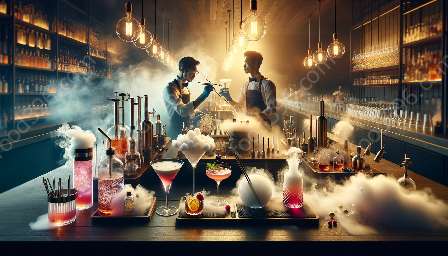Developing cocktails using molecular mixology techniques has revolutionized the art of mixology, offering a new dimension of creativity and innovation in the world of drinks. This article explores the fascinating world of molecular mixology and its application in cocktail development, with a focus on emulsification techniques.
Molecular Mixology: An Overview
Molecular mixology is an experimental approach to cocktail creation that involves the use of scientific methods and tools to manipulate ingredients, textures, and flavors. By applying principles of chemistry and physics, mixologists can transform traditional cocktail recipes into visually stunning and flavor-packed concoctions.
Molecular mixology has gained popularity for its ability to produce avant-garde drinks that challenge conventional norms. The use of innovative techniques such as emulsification, spherification, and foaming has opened up a world of possibilities for mixologists to push the boundaries of creativity and surprise their guests with extraordinary sensory experiences.
Emulsification in Molecular Mixology
Emulsification is a fundamental process in molecular mixology that involves creating stable emulsions by combining immiscible liquids, such as oil and water, using emulsifiers or specialized equipment. By utilizing emulsification techniques, mixologists can achieve unique textures and layers in cocktails, leading to visually appealing and complex flavor profiles.
One common emulsification technique in molecular mixology is the creation of flavored foams and airs. By introducing emulsifiers such as lecithin or soy lecithin to a liquid component, mixologists can emulsify air into the mixture, resulting in a light and airy foam that adds a delicate, ethereal touch to the cocktail.
Additionally, emulsification can be used to craft flavorful suspensions and infusions, where the integration of oil-based flavor components into water-based mixtures is made possible through the creation of stable emulsions. This opens up a world of possibilities for incorporating unique flavors and aromas into drinks, creating an unforgettable drinking experience for patrons.
Cocktail Development through Molecular Mixology
Incorporating molecular mixology techniques, including emulsification, into cocktail development allows mixologists to innovate, experiment, and push the boundaries of traditional drink-making. Through the use of specialized equipment such as rotary evaporators, centrifuges, and vacuum sealers, mixologists can extract, infuse, and emulsify ingredients in ways that were previously unimaginable.
One notable application of emulsification in cocktail development is the creation of modernist cocktails that challenge the senses and perceptions of traditional flavors. By introducing emulsified elements such as flavored foams, suspensions, and emulsified tinctures, mixologists can craft visually stunning and multi-dimensional drinks that captivate and intrigue patrons.
Furthermore, the incorporation of emulsification techniques allows mixologists to experiment with the incorporation of fat-washed spirits, where alcohol is infused with flavorful fats through emulsification, leading to a rich, velvety mouthfeel and an enhanced depth of flavor in the resulting cocktails.
Conclusion
Molecular mixology, with its emphasis on innovation and creativity, has redefined the landscape of cocktail development. Emulsification techniques not only contribute to the visual appeal of cocktails but also play a crucial role in enhancing flavor complexity and texture. As mixologists continue to push the boundaries of traditional mixology with the use of scientific principles and modern technology, the future holds endless possibilities for the creation of extraordinary and unforgettable drinks.

